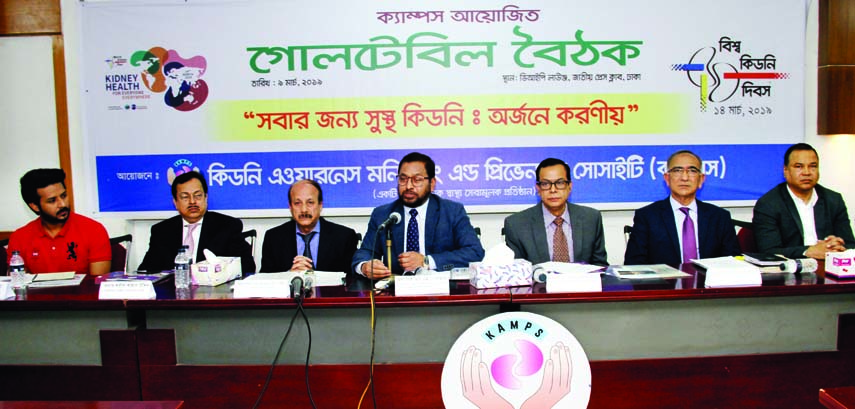
Staff Reporter :
Referring to the fearsome consequences of kidney diseases, it’s excessive treatment cost and widespread growth, speakers at a roundtable discussion meeting on Saturday stressed planned and coordinated effort by the public and private sector hospitals, voluntary healthcare givers and other stakeholder to ensure the rights of kidney health for all.
They urged the authorities concerned to frame a national guideline for raising awareness and running prevention works also to express farm commitment to ensure treatment facilities for the kidney patients irrespective of poor and rich segment of the society.
Kidney Awareness Monitoring and Prevention Society (KAMPS), a non-profit kidney care giving organization arranged the roundtable discussion at the National Press Club in city, in observance of the ‘World Kidney Day-2019’.
Prof. Dr. Harun Or Rashid, Chairman of Kidney Foundation, Prof. Dr. Rafiqul Alam, President, Bangladesh Renal Association, Major Gen. Prof. Dr. H R Harun, Principal, Holy Family Red Crescent Medical College & Hospital, Sharif Shahab Uddin, Editor, Daily Bangladesh Post, Gazi Ashraf Hossain Lipu, former Captain, Bangladesh Cricket Team, Md. Nirob Hossain, Film Star and Model attended the discussion meeting as panel discussants.
Founder and President of KAMPS, also Chief Consultant and Head of Department of Nephrology, BRB Hospitals Limited, Prof. Dr. M A Samad moderated the discussion also presented keynote paper on kidney diseases, its treatment and preventive measures.
Chairman of Kidney Foundation, eminent professor, Dr. Harun Or Rashid said in the developed countries at least 20 to 25 percent of kidney transplantation is done from among close relatives where as in our country for transplantation total 100 percent is dependent on close relatives, this needs to be changed immediately.
Suggesting to frame law so that kidneys from accidental death and untimely dead people can be taken to transplant to the failure patients, Prof. Harun said now only 200 to 250 transplants take place every year but it is possible to rise the number upto 1500 to 2000 through taking kidneys from dead people.
President of Bangladesh Renal Association, Prof. Rafiqul Alam said KAMPS has been a reputed organization at home and abroad by running non-stop awareness rising and prevention works of kidney disease across the country.
He said the government; even Prime Minister herself is so cordial about easing kidney treatment now a days, because already ministry has given order to set up a 10 bed dialysis unit in every public hospitals, so gradually the situation will change.
Prof Rafiq said now globally 850 million people are affected by kidney disease, as per the WHO line up Bangladesh ranks 11th position in terms of kidney disease.
In his keynote speech, Prof. Dr. MA Samad said kidney diseases are spreading rapidly across the country. In Bangladesh more than 2 crore people are somehow affected by kidney disease.
The treatment of kidney disease is so expensive and even 10 percent of people cannot afford this treatment, as a result most of them lose their lives without treatment. Whereas, at least 50 to 60 percent kidney failure can be prevented through a little bit awareness about this disease, for which it needs regular screening that can detect the disease in the early stage.
Journalist Sharif Shahabuddin said people take the doctors guidelines in their lives so importantly and media has the best opportunity to spread the message of prevention in the society.
As a journalist he committed to do everything possible to spread the message of preventing kidney diseases.
Lying emphasize on practicing sound lifestyle, Dr. Samad advised to have regular physical exercise, keeping weight under control, avoidance of smoking and raw salt etc.
Terming the diseases like high Blood Pressure, Cholesterol and Diabetes as the main reason for kidney disease, Dr. Samad urged the government to provide medicines for the diseases free of cost to the poor patients.
“As the treatment of kidney failure is so expensive so the ministries concerned should take initiative to bring the poor patients of the said disease under government subsidy and also under the coverage of health insurance”, Dr. Samad added.
Speakers opined that not by treatment, the widespread growth of kidney disease must be controlled by raising awareness among people.

